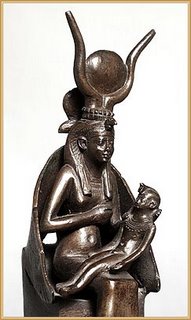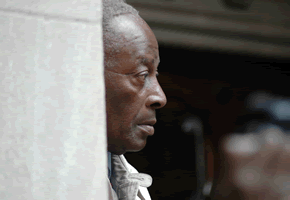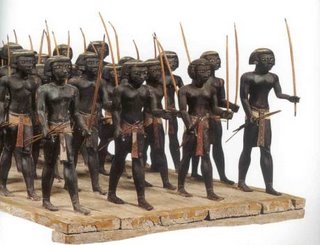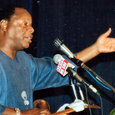 Don’t Move History
Don’t Move History
von Janae Hoffler*
The rally came on the heels of Temple University President Ann Weaver Hart’s appointment of a national search committee for a successor to replace Blockson,
who on June 1 announced his retirement, effective Dec. 31.
When she announced the search committee on Oct. 20, Hart also announced the formation of the Blockson Collection Endowment Committee, to be co-chaired by trustee James S. White and interim provost Richard Englert.
Englert and White would be responsible for raising funds for the preservation and dissemination of Blockson’s collection.
Hart’s office began the fundraising process with a gift of $100,000.
But neither Blockson nor his supporters, who include professors, researchers, historians, undergraduate and graduate students and community leaders, want the sacred collection moved from Sullivan Hall.
At the rally, Blockson stated, “I’m not going to move — period! They’re not going to buy me. One hundred thousand dollars? That is an insult!”
A Temple news report confirmed that the university is “evaluating opportunities to provide the Blockson collection with a permanent and expanded location that will ensure that it is more visible within the University and more accessible to scholars and others.”
“Mr. Blockson’s contributions to the field of African-American scholarship and his important collection will forever inform studies on the Black experience,” Hart said in the report. “His work has strengthened Temple as a center for the scholarly exploration of African-American life and we are committed to ensuring that his collection is preserved and made even more accessible to the future scholars of tomorrow.”
In addition to a suggested move to the campus main library, the university has also suggested relocating the collection to the new Entertainment and Community Education Center on Cecil B. Moore Avenue, stating that it would double the space and enhance the collection’s accessibility.
“To move this library, to tinker with this library, to mess with Charles Blockson’s greatness, is simply a part of the continued problem … of trying to minimize and marginalize the existence of the African in American society,” said University of Pennsylvania professor Dr. Walter D. Palmer.
The collection of prints, photographs, manuscripts, slave narratives and other African and
 African-American artifacts dating back to 1557, is housed in five rooms on the first floor of Sullivan Hall.
African-American artifacts dating back to 1557, is housed in five rooms on the first floor of Sullivan Hall.It includes more than 500,000 photographs, first-edition works by Phyllis Wheatly and W.E.B. DuBois, African Bibles, Paul Robeson’s sheet music, narratives by Sojourner Truth and Frederick Douglass and thousands of taped interviews on African and African-American history and culture.
Harriet Tubman’s shawl, donated to Blockson by Tubman’s great niece, the largest jazz and Negro League collections, the Alpha Boule collection, original letters by William Still, Marcus Garvey and Paul Robeson and archives of Black publications are also part of the acclaimed collection.
Sullivan Hall is only open five days a week from 9 a.m. to 5 p.m. Officials are considering a move to Samuel Paley Library, the campus main library, which is often open past midnight.
Blockson, 73, who began the collection as a teenager, donated the collection to Temple in 1982. It was established in 1984 as a unit of the University Libraries’ Special Collections and is the fifth largest African-American collections at a major university.
Offers for the collection came from Lincoln University, University of Pennsylvania, Penn State University and as far as Nigeria.
An expert on the Underground Railroad and the author of several books, Blockson has lectured internationally, and has organized African-American studies programs throughout the country.
The Norristown native graduated from Penn State University in 1956. He taught local and multicultural history for many years and also led teacher workshops in the Norristown Area School District.
Wednesday he said his contract states that as long as there’s a Temple University, the collection must remain there, and cannot be separated.
Not only should the collection remain at Sullivan Hall, said activist Sacaree Rhoades and Temple professor Dr. Molefi K. Asante, the entire building should house the center for Black studies.
“This building should represent the beginning of the Black Cultural Center of Temple University,” Asante said.
“Let’s get the Black Caucus and the state Senate, if necessary, to work to get funds to build…a building for Black culture right here on this campus,” said Asante. “They have it at Penn, they have it at Penn State, they’ve got it at Delaware; why can’t you have a Black Cultural Center right here?”
A statement from Temple maintains that university officials have made no official decisions regarding the location of the collection, and that no requests have been made since Hart and Englert met Blockson for lunch in September.
“As far as today’s rally, we respect people’s rights to gather and to express opinions about issues that are important to them and important to the university,” spokesman Mark Eyerly said Wednesday. “In this case I think it’s important to remember that the university has not made any decisions about relocating the Blockson Collection, and we have assured Mr. Blockson that if he wants it to remain in Sullivan Hall, it will remain where it is.”
 [ Historian Charles Blockson, left, listens as community activist Sacarre Rhoades speaks during a protest Wednesday ]
[ Historian Charles Blockson, left, listens as community activist Sacarre Rhoades speaks during a protest Wednesday ]Students announced that, should the university decide to move the collection, they would organize 8,000 African-American students to “shut the University down.”
“Nobody is going to run you out of this building,” said Marilyn Jordan, spokeswoman for state Rep. Curtis Thomas. She also said Thomas would provide any funding needed to support and expand the collection.
Blockson helped select and will serve on the search committee with Theresa Powell, vice president for student affairs; Margaret Jerrido, administrator of Urban Archives; professors Asante, William Cutler, Wilbert Jenkins, Nathaniel Norment and Rickie Sanders; librarians Aslaku Berhanu and Mark Darby; David Moltke-Hansen, president and CEO of the Historical Society of Pennsylvania; and V. Chapman-Smith, director of the National Archives and Records Administration Mid-Atlantic Region.
*Janae Hoffler is a Philadelphia-Tribune Staff Writer

![BOIS-CAIMAN-1791-CLUB [the african memory]](https://blogger.googleusercontent.com/img/b/R29vZ2xl/AVvXsEjthfqy-hYzHw7sv58_RVCAameV_WrAgeWBzAhb5XeeFpM9EQegROHsrbJriUiTEbev2AudKEXMVqS4mZLgE3bgcQ6mNUNWzvXUhyphenhyphen-ugR-pL7ymfmq4WxS1dfBAtcPJFANmmtZZrVlYeFgx/s963/BannerBEST-aktuell----.gif)













































0 Kommentare:
Kommentar veröffentlichen